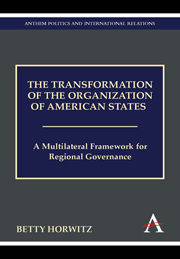 The Transformation of the Organization of American States
The Transformation of the Organization of American States Book contents
- Frontmatter
- Contents
- Prologue
- Glossary
- Chapter I The Role of the Organization of American States in the Promotion of a Multilateral Framework for Regional Governance
- Chapter II The Inter-American System: A History
- Chapter III The Emergence of Consensus Around Democratic Institutions and Shared Norms During the Period of 1991 to 2005
- Chapter IV Collective Security in the Western Hemisphere
- Chapter V Good Governance in the Western Hemisphere: The Unit for Promotion of Democracy, currently the Organization for Promotion of Democracy
- Chapter VI Conclusions
- Appendix A
- Appendix B
- Notes
- Bibliography
- Index
Chapter III - The Emergence of Consensus Around Democratic Institutions and Shared Norms During the Period of 1991 to 2005
Published online by Cambridge University Press: 05 March 2012
- Frontmatter
- Contents
- Prologue
- Glossary
- Chapter I The Role of the Organization of American States in the Promotion of a Multilateral Framework for Regional Governance
- Chapter II The Inter-American System: A History
- Chapter III The Emergence of Consensus Around Democratic Institutions and Shared Norms During the Period of 1991 to 2005
- Chapter IV Collective Security in the Western Hemisphere
- Chapter V Good Governance in the Western Hemisphere: The Unit for Promotion of Democracy, currently the Organization for Promotion of Democracy
- Chapter VI Conclusions
- Appendix A
- Appendix B
- Notes
- Bibliography
- Index
Summary
Introduction
This chapter examines the circumstances that have encouraged the emergence of a consensus around democratic institutions and values in the Western Hemisphere during the Post-Cold War era. Specifically, this chapter focuses on the role and impact of the Organization of American States (OAS) in promulgating democratic institutions and values in Latin America and the Caribbean. This chapter examines the OAS in an effort to evaluate the degree of effectiveness that its actions and decisions have had in fostering reform in support for democracy as the most appropriate inter-governmental alternative among its member states. The consensus emerging around democratic institutions and norms in the Western Hemisphere is not perfect by any means, yet it is important to note that this consensus has progressively taken hold, and that the interruptions to democratic governments in the region have been increasingly infrequent and subject to punishment.
As a preamble to the chapter, the first section introduces the basic concepts that guide the discussion and identifies the conditions and specific moments in the period encompassed by the end the first Gulf War and the fall of the former Soviet Union in 1991, up to the time of the Fourth Summit of the Americas in Mar del Plata in November, 2005, which have either favored or frustrated the acceptance and internalization of democratic norms and values in the Western Hemisphere.
- Type
- Chapter
- Information
- The Transformation of the Organization of American StatesA Multilateral Framework for Regional Governance, pp. 31 - 72Publisher: Anthem PressPrint publication year: 2010


